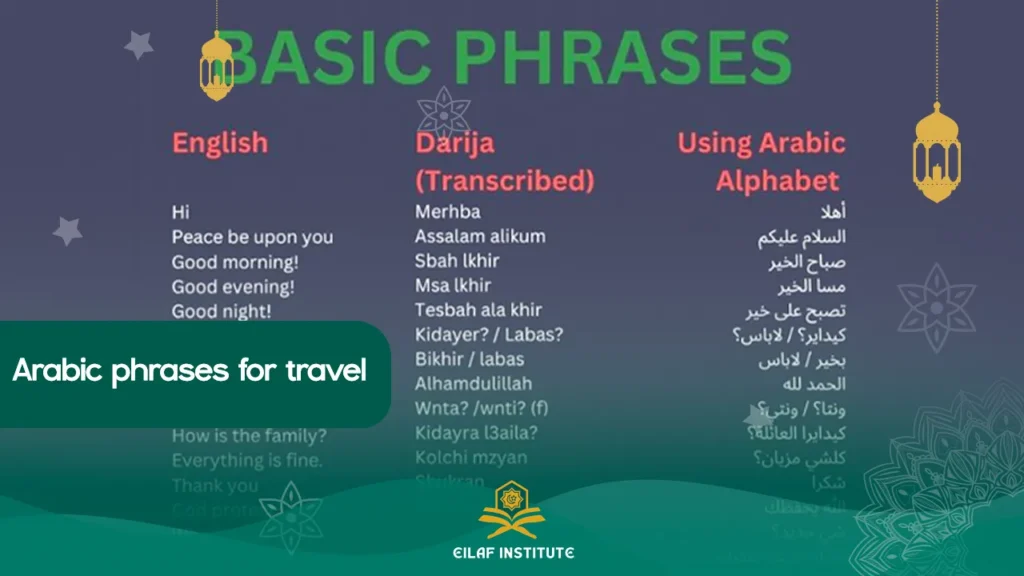If you want to travel to an Arabic-speaking country, you need to know about Arabic Phrases For Travel that will help you to communicate with the people of this country and tell them what you want.
In this article, we will provide you with the Arabic phrases for travel that you might need in your visit to an Arab country and will make you communicate with the native speaker easily.
Arabic phrases for travel
Knowing some basic Arabic words can help you a lot while traveling to an Arab region. Let’s explore some of them together:
1. Arabic greetings and responses
Hello – السلام عليكم (As-salāmu ʿalaykum)
This is the most common greeting, meaning “Peace be upon you.” It’s widely used throughout the Arabic-speaking world.
Hi – مرحباً (Marḥabān)
A friendly, informal greeting that you can use in more casual settings.
Good Morning – صباح الخير (Ṣabāḥ al-khayr)
Used in the morning to greet others.
Good Evening – مساء الخير (Masā’ al-khayr)
Used in the evening to greet others.
Goodbye – وداعاً (Wadāʿan)
A formal way to say goodbye.
How are you? – كيف حالك؟ (Kayfa ḥāluka?) [Male] / كيف حالكِ؟ (Kayfa ḥāluki?) [Female]
A polite way to ask someone how they are.
I am fine – أنا بخير (Ana bikhayr)
A response to “How are you?”
Read also about : Best 12 Tips To Learn Arabic Online
2. Important Polite Phrases
Please – من فضلك (Min faḍlik)
A polite way to ask for something.
Thank you – شكراً (Shukran)
An essential phrase to express gratitude.
You’re welcome – عفواً (ʿAfwan)
Used to respond to “thank you.”
Excuse me – معذرة (Ma’ziratan)
Used to get somebody’s attention or to apologize.
Sorry – آسف (Āsif)
A polite way of apologizing.
Yes – نعم (Naʿam)
Used to affirm or agree.
No – لا (Lā)
Used to deny or disagree.
- Numbers (Basic)
One – واحد (Wāḥid)
Two – اثنان (Ithnān)
Three – ثلاثة (Thalātha)
Four – أربعة (Arbaʿa)
Five – خمسة (Khamsa)
Ten – عشرة (ʿAshara)
Numbers are basic necessities when dealing with money, directions, and quantities.
Join us now and book our Conversational Arabic course
4. Directions and Locations
Where? – أين؟ (Ayn?)
A helpful word to ask for locations.
Where is.? – أين يقع.؟ (Ayn yaqāʿ.?)
Used to ask the location of specific places.
Left – يسار (Yasār)
Used when giving or asking for directions.
Right – يمين (Yamīn)
Used when giving or asking for directions.
Straight ahead – مباشرة (Mubāsharatan)
Used to indicate going forward.
Hotel – فندق (Funduq)
An important word for finding places to stay.
Bathroom – دورة المياه (Dawrat al-miyāh) or الحمام (Al-ḥammām)
Essential for asking where the restroom is.
5. Transportation and Travel
Taxi – تاكسي (Tāksī)
The word “taxi” is widely understood, though you may encounter variations.
Bus – حافلة (Ḥāfila)
The word for a bus.
Train – قطار (Qiṭār)
The word for a train.
Airport – مطار (Maṭār)
An important word for traveling by air.
Ticket – تذكرة (Tadhkira)
Useful for booking and asking about tickets.
6. Shopping and Money
How much is this? – كم ثمن هذا؟ (Kam thaman hādhā?)
A very important question when purchasing items.
Expensive – غالي (Ghālī)
Used to describe something that is too expensive.
Cheap – رخيص (Rakhīṣ)
Used to describe something that is cheap.
Money – مال (Māl)
A general term used to refer to money.
I don’t understand – أنا لا أفهم (Ana lā afham)
A useful phrase if you don’t know what is going on.
7. Food and Drink
Water – ماء (Mā’)
Essential for keeping hydrated.
Food – طعام (Ṭaʿām)
Helpful when trying to get information about meal times or food.
Coffee – قهوة (Qahwa)
Arabia’s favorite drink
Tea – شاي (Shāy)
Another widespread drink
Breakfast – إفطار (Iftār)
Means the early meal. People especially eat it when they are fasting in the month of Ramadan.
Vegetarian – نباتي (Nabātī)
If you are vegetarian this word helps you
8. Emergencies and Health
Help! – النجدة! (An-najda!)
An urgent cry for help.
Doctor – طبيب (Ṭabīb)
Helpful when you are injured or ill.
Hospital – مستشفى (Mustashfā)
Important when looking for a healthcare facility.
Pharmacy – صيدلية (Ṣaydaliyya)
The important word if you are looking for medicines or anything related to health.
9. Common Courtesy
May I.? – هل يمكنني.؟ (Hal yumkinunī.?)
The most polite way of asking for something.
I need help – أحتاج مساعدة (Aḥtāj musāʿada)
This sentence is used when you’re in need of someone’s help.
Sorry, I don’t speak Arabic – عذراً، لا أتحدث العربية (ʿUdhra, lā atahaddath al-‘Arabiyya)
A polite phrase if you’re unable to speak Arabic well.
Read also about: How Long Does It Take To Learn Arabic For English Speakers?
Want to Learn More Arabic?
If you’re interested in improving your Arabic language skills before you travel, consider enrolling in language classes at EILAF Institute.
Our experienced teachers can help you get ready for your trip and build a strong foundation in Arabic.
Start your language learning journey today! Arabic Conversation Course will help you master the Arabic language.

